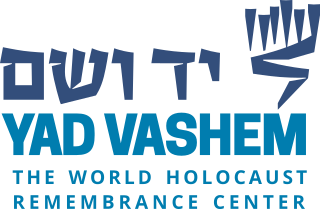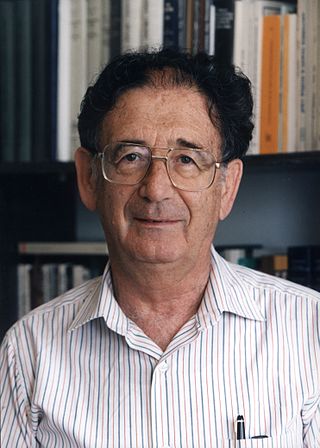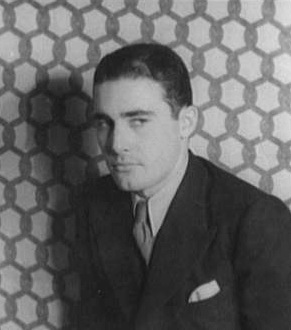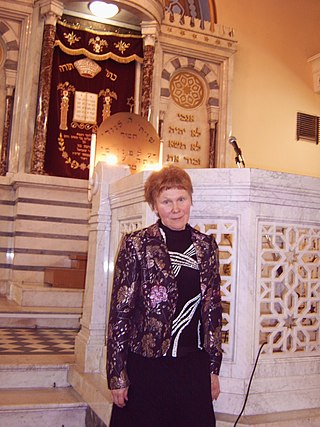Related Research Articles

Holocaust denial is an antisemitic conspiracy theory that asserts that the Nazi genocide of Jews, known as the Holocaust, is a myth, fabrication, or exaggeration. Holocaust denial involves making one or more of the following false claims:

Yad Vashem is Israel's official memorial to the victims of the Holocaust. It is dedicated to preserving the memory of the Jews who were murdered; echoing the stories of the survivors; honoring Jews who fought against their Nazi oppressors and gentiles who selflessly aided Jews in need; and researching the phenomenon of the Holocaust in particular and genocide in general, with the aim of avoiding such events in the future. Yad Vashem's vision, as stated on its website, is: "To lead the documentation, research, education and commemoration of the Holocaust, and to convey the chronicles of this singular Jewish and human event to every person in Israel, to the Jewish people, and to every significant and relevant audience worldwide."

Righteous Among the Nations is an honourific used by the State of Israel to describe all of the non-Jews who, for purely altruistic reasons, risked their lives in order to save Jews from being exterminated by Nazi Germany during the Holocaust. The term originates from the concept of ger toshav, a legal term used to refer to non-Jewish observers of the Seven Laws of Noah.

Yehuda Bauer is a Czech-born Israeli historian and scholar of the Holocaust. He is a professor of Holocaust Studies at the Avraham Harman Institute of Contemporary Jewry at the Hebrew University of Jerusalem.
Names of the Holocaust vary based on context. "The Holocaust" is the name commonly applied in English since the mid-1940s to the systematic extermination of almost 6 million European Jews by Nazi Germany during World War II. The term is also used more broadly to include the Nazi Party's systematic murder of millions of people in other groups they determined were "Untermenschen" or "subhuman," which included primarily the Jews and the Slavs, the former having allegedly infected the latter, including ethnic Ukrainians, Poles, the Serbs, the Czechs and others.

The International Holocaust Remembrance Day, or the International Day in Memory of the Victims of the Holocaust, is an international memorial day on 27 January that commemorates the victims of the Holocaust, which resulted in the genocide of one third of the Jewish people, along with countless members of other minorities by Nazi Germany between 1933 and 1945, an attempt to implement its "final solution" to the Jewish question. 27 January was chosen to commemorate the date when the Auschwitz concentration camp was liberated by the Red Army in 1945.
The Encyclopedia of the Holocaust (1990) has been called "the most recognized reference book on the Holocaust". It was published in an English-language translated edition by Macmillan in tandem with the Hebrew language original edition published by Yad Vashem, the Holocaust Remembrance Authority in Israel. All its contributors are reputable Holocaust scholars and academics. Although the encyclopedia is easy to read and use and contains no disturbing pictures, it is not recommended for users younger than high school age.

Holocaust survivors are people who survived the Holocaust, defined as the persecution and attempted annihilation of the Jews by Nazi Germany and its allies before and during World War II in Europe and North Africa. There is no universally accepted definition of the term, and it has been applied variously to Jews who survived the war in German-occupied Europe or other Axis territories, as well as to those who fled to Allied and neutral countries before or during the war. In some cases, non-Jews who also experienced collective persecution under the Nazi regime are considered Holocaust survivors as well. The definition has evolved over time.
The International Conference to Review the Global Vision of the Holocaust was a two-day conference in Tehran, Iran that opened on December 11, 2006. Iranian foreign minister Manouchehr Mottaki said the conference sought "neither to deny nor prove the Holocaust... [but] to provide an appropriate scientific atmosphere for scholars to offer their opinions in freedom about a historical issue". Participants included David Duke, Moshe Aryeh Friedman, Robert Faurisson, Fredrick Töben, Richard Krege, Michèle Renouf, Ahmed Rami and Yisroel Dovid Weiss of Neturei Karta.

Khaled Abdul-Wahab was a Tunisian Muslim Arab man who saved several Jewish families from Nazi persecution, in Vichy-controlled Tunisia during the Holocaust. He has been called the 'Tunisian Schindler'.

Nathan Rapoport (1911–1987) was a Warsaw-born Jewish sculptor and painter, later a resident of Israel and then the United States.
The relations between Pope Benedict XVI and Judaism remained fairly good, although concerns were raised by Jewish leaders over the political impact of Traditionalists in the Church during the papacy of Benedict.
Pope John Paul II worked to improve relations between the Roman Catholic Church and Judaism. He built solid ties with the Jewish community in the hope of promoting Christian–Jewish reconciliation.
Yad Vashem, the state of Israel's official Holocaust memorial, has generally been critical of Pope Pius XII, the pope during The Holocaust. For decades, Pius XII has been nominated unsuccessfully for recognition as Righteous Among the Nations, an honor Yad Vashem confers on non-Jews who saved Jewish lives during the Holocaust altruistically and at risk to their own lives.

Yehuda Bacon is an Israeli artist who survived the Holocaust.

The Garden of the Righteous Among the Nations is part of the much larger Yad Vashem complex located on the Mount of Remembrance in Jerusalem. Along with some two dozen different structures within the Yad Vashem memorial – which is the second most-visited destination in the country after the Western Wall – the Garden of the Righteous is meant to honor those non-Jews who during the Holocaust risked their lives to save Jews from extermination by the Nazis.

Tamara Zitcere was a Latvian scientist, Holocaust researcher and teacher of Northern States Gymnasium. She is known for her research - the Riga Ghetto's List.

Esther Farbstein is an Israeli historian, researcher, author, and lecturer. Considered the leading Haredi scholar of the Holocaust, she focuses on the spiritual responses of Jews to Nazi persecution. She has introduced new sources for academic research on the Holocaust, and has also shepherded the incorporation of Holocaust education in Haredi girls schools. In 1994, she founded and became head of the Center for Holocaust Studies at Michlalah–Jerusalem College in Bayit Vegan, Jerusalem. She is the author of numerous books, articles, and monographs in Hebrew and English.
The International Conference on the Holocaust and Genocide was the first major conference in the field of genocide studies, held in Tel Aviv on 20–24 June 1982. It was organized by Israel Charny, Elie Wiesel, Shamai Davidson, and their Institute on the Holocaust and Genocide, founded in 1979. The conference's objective was to further the understanding and prevention of all genocides; it marked the shift from viewing genocide as an irrational phenomenon to one that could be studied and understood.
Dan Michman is a Jewish historian. He is the head of the International Institute for Holocaust Research at Yad Vashem in Jerusalem and incumbent of the John Najmann Chair of Holocaust studies.
References
- 1 2 3 4 Matthew B. Stannard, San Francisco Chronicle, August 3, 2005
- ↑ Charles A. Radin, "Muslim Opens Holocaust Museum in Israel," Boston Globe, 6 May 2005
- ↑ Noga Tasrnopolsky, Forward, April 29, 2005
- 1 2 Tim McGirk, "Teaching Auschwitz to the Palestinians," Time, 8 July 2008
- 1 2 3 4 Bjorn Rosen, "An Arab and His Holocaust Museum," Der Tagesspiegel, 16 January 2008 (in German)
- ↑ Noga Tarnopolsky, "Nazareth: The Arab Institute for the Holocaust Research and Education," The Jewish Daily Forward, April 29, 2005
- ↑ Brenda Gazzar, "Arab Museum & Myth That Israel Was Created Because of the Holocaust," Israel News, 12 April 2007
- ↑ "Estee Yaari, Yad Vashem spokeswoman, released the following statement: "At the beginning of this venture, Yad Vashem had hoped that Mahameed's initiative was a sincere desire to learn about and teach about the Holocaust, and indeed, Mahameed was here at Yad Vashem to meet with staff, and receive material. However, as we read more of his writings, it appears that he is conflating the Holocaust with other events and contributing to the misappropriation of the Holocaust as a tool against Israel. Yad Vashem believes that the Holocaust should not be politicized". Cf. Lorenzo Kamel, "Spiegare la Shoah agli Arabi. Khaled ci prova". Europa, 18 novembre 2009". Archived from the original on 2011-07-22. Retrieved 2009-11-21.
- ↑ Roi Mandel, "Naalin Holds Holocaust Exhibit," ''Israel News, 27 January 2009
- ↑ Daniel Estrin, "West Bank Exhibit's Aim: To Teach Palestinians About Holocaust," USA Today, April 22, 2009
- ↑ Orly Halpern, "Iran Denies Visa to an Arab Shoah Scholar," The Jewish Daily Forward, 15 December 2006